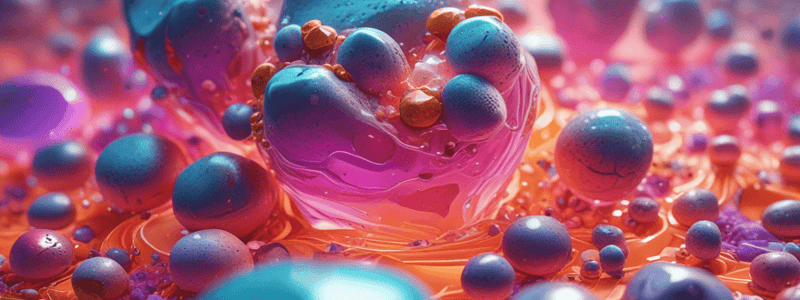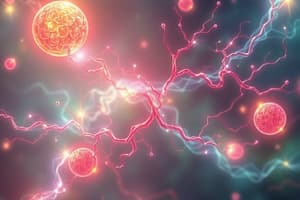Podcast
Questions and Answers
What is the main reason non-invasive methods are only effective on small stones?
What is the main reason non-invasive methods are only effective on small stones?
- They target specific types of stones
- They do not require medical management
- They have a low recurrence rate
- They are unable to dissolve large stones effectively (correct)
Which type of stones form in the presence of urease-splitting organisms?
Which type of stones form in the presence of urease-splitting organisms?
- Oxalate stones
- Calcium stones
- Cystine stones
- Struvite stones (correct)
What is the recommended method to prevent cystine stone formation?
What is the recommended method to prevent cystine stone formation?
- Maintaining urine pH below 6.5
- Avoiding hydration to concentrate the urine
- Increasing urinary volume through dehydration
- Using alkalizing agents like potassium citrate (correct)
Why do patients often struggle with tiopronin as a treatment for cystinuria?
Why do patients often struggle with tiopronin as a treatment for cystinuria?
What is a common side effect of using D-penicillamine for cystinuria?
What is a common side effect of using D-penicillamine for cystinuria?
What percentage of the UK urolithiasis population is affected by cystinuria?
What percentage of the UK urolithiasis population is affected by cystinuria?
What is the primary factor that leads to the formation of uric acid stones?
What is the primary factor that leads to the formation of uric acid stones?
How do uric acid and urates affect the formation of calcium-based stones?
How do uric acid and urates affect the formation of calcium-based stones?
What is the primary mechanism by which calcium oxalate stones form?
What is the primary mechanism by which calcium oxalate stones form?
What is the key difference between brushite and hydroxyapatite calcium phosphate stones?
What is the key difference between brushite and hydroxyapatite calcium phosphate stones?
Why is understanding the specific type of urinary stone important?
Why is understanding the specific type of urinary stone important?
What is the primary factor that differentiates the formation of calcium phosphate stones from calcium oxalate stones?
What is the primary factor that differentiates the formation of calcium phosphate stones from calcium oxalate stones?
Which substance is believed to prevent recurrence of calcium oxalate stone formation?
Which substance is believed to prevent recurrence of calcium oxalate stone formation?
What is the primary effect of allopurinol in inhibiting uric acid stone formation?
What is the primary effect of allopurinol in inhibiting uric acid stone formation?
What is a common side effect of allopurinol hypersensitivity syndrome?
What is a common side effect of allopurinol hypersensitivity syndrome?
What is the primary mechanism of action of rasburicase in preventing uric acid stone formation?
What is the primary mechanism of action of rasburicase in preventing uric acid stone formation?
What is the main function of uricosuric drugs in the context of uric acid stone formation?
What is the main function of uricosuric drugs in the context of uric acid stone formation?
How do loops and thiazide diuretics differ in their effectiveness for treating uricosuria?
How do loops and thiazide diuretics differ in their effectiveness for treating uricosuria?
What is the significance of ammonium in blocking the formation of uric acid crystals?
What is the significance of ammonium in blocking the formation of uric acid crystals?
Why is distinguishing between calcium phosphate and calcium oxalate stone-formers important?
Why is distinguishing between calcium phosphate and calcium oxalate stone-formers important?
Which substance accounts for a significant percentage of all urinary stones in developed countries?
Which substance accounts for a significant percentage of all urinary stones in developed countries?
What is a potential complication associated with high doses of thiazide diuretic agents in treating urinary stones?
What is a potential complication associated with high doses of thiazide diuretic agents in treating urinary stones?
Flashcards are hidden until you start studying




